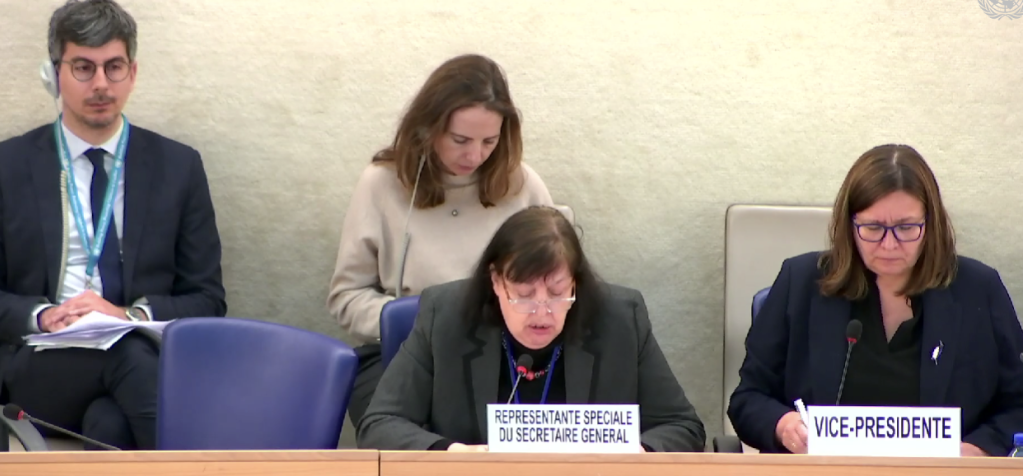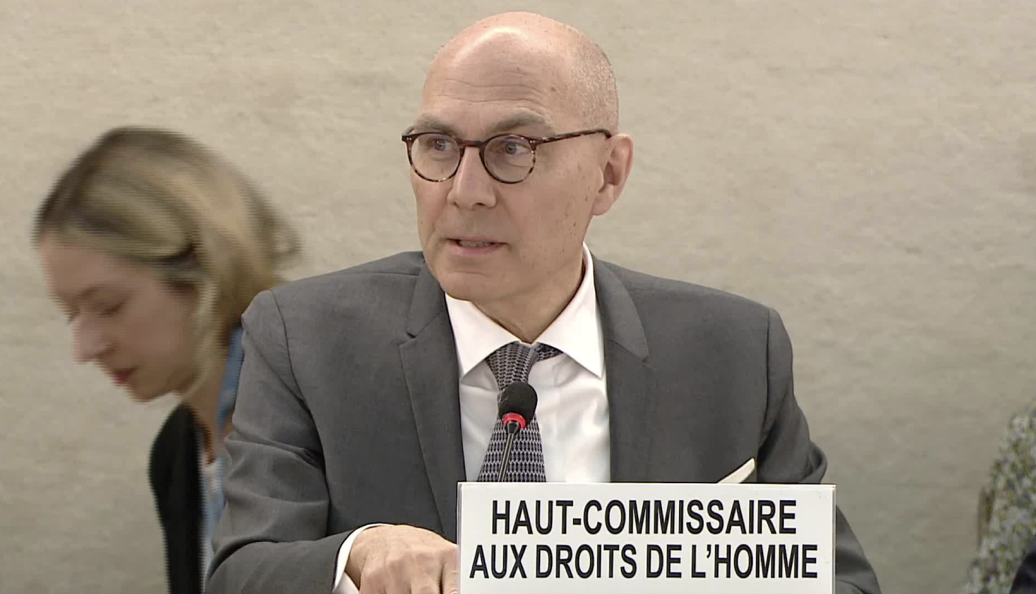Refugees wait for a food distribution point to open at a camp in Adré, Chad, on 22 April 2024.
By Marisa Were/GICJ
Background
On 15 April 2023, the Sudanese Army Forces (SAF) and the Rapid Support Forces (RSF) paramilitary group interrupted Sudan’s democratic political transition. At first, when the fighting broke out, there was hope that it would not last, but it has been over a year, and the war is still going on.
The conflict originated in Khartoum, quickly spreading to Darfur and then to Kordofans, and it continues to spread throughout the country. The continuation of the war is affecting and impacting the lives and livelihoods of Sudanese citizens as well as Sudan’s neighbouring countries. For example, the war’s spread to El Gezira – a main agricultural production centre – has led to roughly 18 million people suffering food insecurity. The war and its impact are leading Sudan to become one of the world’s worst humanitarian tragedies and one of the largest internal displacement crises globally, according to UNHCR External Update #59 on Sudan.
Effects of the Conflict
Since 15 April 2023, the conflict has seen over 14,000 people killed and tens of thousands wounded. An estimated 27 million people – almost half of the country’s – population need lifesaving assistance, while more than 8.6 million people are being forced to flee their homes, which includes 1.8 million refugees[1]. To date, there are an estimated 3 million displaced children[2], which means that the emerging child protection crisis will impact not only today’s generation but most likely the next as well. In addition, Sudan hosts around 9 million internally displaced persons (IDPs), one of the largest numbers of IDPs globally, of which 6.8 million are displaced as a result of the ongoing conflict[3]. Vast numbers of allegations of atrocities have been made, as documented in reports of the widespread use of sexual violence as a weapon of war, the recruitment of children to fight in the conflict, and the apparent use of torture and prolonged arbitrary detention from both the SAF and RSF.
The fighting has caused extensive damage to critical infrastructure (such as water and healthcare), the collapse of banking and financial services, and frequent interruptions to electricity supply and telecommunication services. The war has left around 25 million Sudanese in need of aid as it has cut off vulnerable civilians in urgent need of essentials such as food, water, and medicine. An estimate states that 70% of health facilities[4] in the country are not working, and the remaining ones are left overwhelmed by the number of people seeking medical assistance. Access to healthcare attention and facilities has been heavily limited, making it essential for humanitarian aid to enter the country to assist in treating the wounded. In addition, Sudan is at imminent risk of famine as the war continues to increase the number of people suffering from acute food insecurity, roughly 18 million people[5].
Sudan is not the only country facing the effects of the conflict; neighbouring countries have also suffered terrible consequences. The conflict is damaging relationships with Sudan’s allies because it is putting pressure on neighbouring countries like Chad, Eritrea, Ethiopia, Uganda, and South Sudan to take in refugees and migrants who are fleeing from it, with around 2 million people seeking refuge within neighbouring countries’ borders[6]. Outside of assisting refugees and migrants, Sudan’s neighbours also have to protect themselves from armed groups based at their shared borders and actively involved in the conflict. This has meant a loss of trade and economic relationships, specifically with South Sudan, which relies on Sudan for the transport route for oil production and distribution, on which 90% of South Sudan’s economy is dependent.
Sudan’s security situation has been volatile and complex, and several concerning developments have impacted the humanitarian crisis in various regions, meaning the consequences of this ongoing conflict will take significant time to recover from. Mohamed Ibn Chambas, the High Representative for the Silencing the Guns Initiative of the African Union Commission, stressed, “The war has set the country back several decades, and it will take more than a generation to rebuild Sudan to its pre-war state.” The prospects of Sudan attaining the Sustainable Development Goals or the African Union’s Agenda 2063 are becoming more and more black every day, essentially condemning millions of Sudanese to suffering for years to come.
Response: United Nations Organisations and other Non-Governmental Organisations
On 25 April 2024, the United Nations (UN) Special Representative on Sexual Violence in Conflict and the Deputy Emergency Relief Coordinator urged the Security Council members to take immediate action to ensure an end to the occurrence of sexual violence against women and girls. Then, on 27 April 2024, the UN Security Council members called on the SAF and RSF parties in Sudan to immediately halt the military build-up and take steps to de-escalate the situation in El Fasher, North Darfur because of reports of an imminent offensive by the RSF and their allied militia against the city. The United States ambassador to the UN, on 29 April 2024, warned that more than 2 million people[7] in El Fasher are under imminent threat of a large-scale massacre and urged the international community to pressure SAF and RSF to scale back on the conflict and maybe call for a ceasefire.
A joint assessment mission to Omdurman, Khartoum State, by the United Nations High Commissioner for Refugees (UNHCR) and Commissioner for Refugees (COR) occurred from the 23rd to the 26th of April 2024. The mission aimed to evaluate the humanitarian situation and urgent needs of the displaced populations affected by the conflict. During the mission, members met with local authorities, refugees, and internally displaced communities and visited sites hosting displaced populations in Omdurman. The observations from the mission highlighted significant humanitarian needs such as limited access to essential services such as food, shelter, healthcare, and livelihood opportunities, significant protection challenges, safety concerns, reports on gender-based violence, inadequate legal support, and insufficient child protection. Within the mission report, it was also noted that there is a need to strengthen partners’ capacities and mobilise resources to meet the urgent needs of the displaced populations.
On 28 April 2024, there was an Inter-agency Emergency Directors’ Group (EDG) mission that was made of representatives from ICA, OIM, InterAction, OCHA, NRC, UNFPA, UNHCR, UNICEF, WHO, and World Vision that arrived in Port Sudan. This mission aimed to engage with the humanitarian community and local authorities to assess additional resources needed to sustain operations, support fundraising and advocacy efforts, and identify strategies to overcome access constraints and bureaucratic impediments.
Response: The International Humanitarian Conference
On 15 April, exactly one year after the conflict in Sudan broke out, France, Germany, and the European Union (EU) organised The International Humanitarian Conference for Sudan and Neighbouring Countries in Paris. The conference brought together ministers and representatives of 58 States, including neighbouring and regional countries and donors; representatives of regional organisations such as the African Union, the Inter-governmental Authority on Development, the League of Arab States; the Personal Envoy of the United Nations Secretary-General for Sudan and the leaders or representatives of many UN programmes and agencies, such as OCHA, UNHCR, WHO, WFP, IOM, UNFPA, and UNDP; the president of ICRC; and representatives of the World Bank, the IMF and the Arab Development Bank.
The conference aimed to call on the warring parties (SAF and RSF) to cease their hostilities, adhere to international humanitarian law and ensure complete, safe, and unhindered humanitarian access to the entire Sudanese territory, including through cross-border operations. In addition, the conference sought to eliminate any challenges to aid delivery and mobilise essential funding for humanitarian response in Sudan and neighbouring countries. The funding was crucial for boosting humanitarian aid to prevent further food insecurity leading to the impending famine.
During the conference, France, Germany, and the EU expressed solidarity with and support for the Sudanese people, who are the primary victims of the war. The States and Governing Bodies strongly condemned the violence against civilians, including attacks on ethnic groups, the indiscriminate bombardment of residential areas and sexual and gender-based violence, including against children. As the UN had appealed for funding on 7 February 2024, at the conference, international donors announced that they would provide $2 billion, including nearly €900 million from the EU and its Member States, which is to be used to support civilian populations in Sudan and those who are seeking refuge in neighbouring countries[8].
Geneva International Centre for Justice (GICJ) calls for the international community to continue to put in collective efforts to ensure that Sudan does not become a forgotten crisis. It is critical now more than ever for the global community, the SAF and the RSF to remember their obligations under humanitarian law and cease the fighting that is devastating not only innocent Sudanese civilians but neighbouring countries as well. GICJ calls for a ceasefire to allow humanitarian aid to reach those in need properly and urges the international community to continue in its response to alleviate the atrocities happening in Sudan.
________________________________
[1] https://press.un.org/en/2024/sc15672.doc.htm
[2] https://humanitarianaction.info/plan/1188/document/sudan-humanitarian-needs-and-response-plan-2024
[3] https://www.diplomatie.gouv.fr/en/country-files/sudan/news/article/international-humanitarian-conference-for-sudan-and-neighbouring-countries
[4] https://humanitarianaction.info/plan/1188/document/sudan-humanitarian-needs-and-response-plan-2024
[5] https://www.diplomatie.gouv.fr/en/country-files/sudan/news/article/international-humanitarian-conference-for-sudan-and-neighbouring-countries
[6] Ibid.
[7] https://data.unhcr.org/en/documents/details/108427
[8] https://www.diplomatie.gouv.fr/en/country-files/sudan/news/article/international-humanitarian-conference-for-sudan-and-neighbouring-countries







